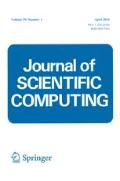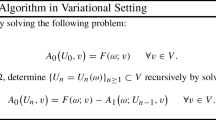Abstract
In this paper, we develop two ensemble time-stepping algorithms to solve the convection-diffusion equation with random diffusion coefficients, forcing terms and initial conditions based on the pseudo-spectral stochastic collocation method. The key step of the pseudo-spectral stochastic collocation method is to solve a number of deterministic problems derived from the original stochastic convection-diffusion equation. In general, a common way to solve the set of deterministic problems is by using the backward differentiation formula, which requires us to store the coefficient matrix and right-hand-side vector multiple times, and solve them one by one. However, the proposed algorithm only need to solve a single linear system with one shared coefficient matrix and multiple right-hand-side vectors, reducing both storage required and computational cost of the solution process. The stability and error analysis of the first- and second-order ensemble time-stepping algorithms are provided. Several numerical experiments are presented to confirm the theoretical analyses and verify the feasibility and effectiveness of the proposed method.




Similar content being viewed by others
References
Xiu, D., Hesthaven, J.S.: High-order collocation methods for differential equations with random inputs. SIAM J. Sci. Comput. 27, 1118–1139 (2005)
Xiu, D.: Efficient collocational approach for parametric uncertainty analysis. Commun. Comput. Phys. 2, 293–309 (2007)
Xiu, D.: Fast numerical methods for stochastic computations: a review. Commun. Comput. Phys. 5, 242–272 (2009)
Xiu, D.: Stochastic collocation methods: a survey. In: Ghanem, R., Higdon, D., Owhadi, H. (eds.) Handbook of Uncertainty Quantification. Springer, Cham (2017)
Babuska, I., Tempone, R., Zouraris, G.E.: Galerkin finite element approximations of stochastic elliptic partial differential equations. SIAM J. Numer. Anal. 42, 800–825 (2004)
Babuska, I., Nobile, F., Tempone, R.: A stochastic collocation method for elliptic partial differential equations with random input data. SIAM J. Numer. Anal. 45, 1005–1034 (2007)
Babuska, I., Nobile, F., Tempone, R.: A stochastic collocation method for elliptic partial differential equations with random input data. SIAM Rev. 52, 317–355 (2010)
Nobile, F., Tempone, R., Webster, C.G.: A sparse grid stochastic collocation method for partial differential equations with random input data. SIAM J. Numer. Anal. 46, 2309–2345 (2008)
Zhang, G., Gunzburger, M.: Error analysis of a stochastic collocation method for parabolic partial differential equations with random input data. SIAM J. Numer. Anal. 50, 1922–1940 (2012)
Zhang, Q., Li, Z., Zhang, Z.: A sparse grid stochastic collocation method for elliptic interface problems with random input. J. Sci. Comput. 67, 262–280 (2016)
Tang, T., Zhou, T.: Recent developments in high order numerical methods for uncertainty quantification. Sci. Sin. Math. 45, 891–928 (2015)
Tang, T., Zhou, T.: On discrete least-squares projection in unbounded domain with random evaluations and its application to parametric uncertainty quantification. SIAM J. Sci. Comput. 36, A2272–A2295 (2014)
Jakeman, J.D., Narayan, A., Zhou, T.: A generalized sampling and preconditioning scheme for sparse approximation of polynomial chaos expansions. SIAM J. Sci. Comput. 39, A1114–A1144 (2017)
Narayan, A., Zhou, T.: Stochastic collocation on unstructured multivariate meshes. Commun. Comput. Phys. 18, 1–36 (2015)
Guo, L., Narayan, A., Zhou, T., Chen, Y.: Stochastic collocation methods via \(\ell _1\) minimization using randomized quadratures. SIAM J. Sci. Comput. 39, A333–A359 (2017)
Chen, L., Zheng, B., Lin, G., Voulgarakis, N.: A two-level stochastic collocation method for semilinear elliptic equations with random coefficients. J. Comput. Appl. Math. 315, 195–207 (2017)
Fishman, G.: Monte Carlo: Concepts, Algorithms, and Applications. Springer, New York (1996)
Jiang, N., Layton, W.: An algorithm for fast calculation of flow ensembles. Int. J. Uncertain. Quantif. 4, 273–301 (2014)
Jiang, N., Kaya, S., Layton, W.: Analysis of model variance for ensemble based turbulence modeling. Comput. Meth. Appl. Math. 15, 173–188 (2015)
Jiang, N.: A higher order ensemble simulation algorithm for fluid flows. J. Sci. Comput. 64, 264–288 (2015)
Gunzburger, M., Jiang, N., Wang, Z.: An efficient algorithm for simulating ensembles of parameterized flow problems, IMA J. Numer. Anal. (2018). https://doi.org/10.1093/imanum/dry029
Gunzburger, M., Jiang, N., Wang, Z.: A second-order time-stepping scheme for simulating ensembles of parameterized flow problems. Comput. Methods Appl. Math. (2018). https://doi.org/10.1515/cmam-2017-0051
Fiordilino, J.A.: A second order ensemble timestepping algorithm for natural convection. SIAM J. Numer. Anal. 56, 816–837 (2018)
Fiordilino, J.A., Khankan, S.: Ensemble timestepping algorithms for natural convection. Int. J. Numer. Anal. Model. 15, 524–551 (2018)
Mohebujjaman, M., Rebholz, L.: An efficient algorithm for computation of MHD flow ensembles. Comput. Methods Appl. Math. 17, 121–137 (2017)
Fiordilino, J.A.: Ensemble timestepping algorithms for the heat equation with uncertain conductivity. Numer. Meth. Partial. Differ. Eqs. 34, 1901–1916 (2018)
Luo, Y., Wang, Z.: An ensemble algorithm for numerical solutions to deterministic and random parabolic PDEs. SIAM J. Numer. Anal. 56, 859–876 (2018)
Phoon, K.K., Huang, S.P., Quek, S.T.: Simulation of second-order processes using Karhunen-Loève expansion. Comput. Struct. 80, 1049–1060 (2002)
Zhang, D., Lu, Z.: An efficient, high-order perturbation approach for flow in random porous media via Karhunen-Loève and polynomial expansions. J. Comput. Phys. 194, 773–794 (2004)
Øksendal, B.: Stochastic Differential Equations: an Introduction with Applications. Springer, Berlin (2003)
Brenner, S., Scott, R.: The Mathematical Theory of Finite Element Methods, vol. 15. Springer, New York (2007)
Hecht, F.: New development in freefem++. J. Numer. Math. 20, 251–265 (2012)
Acknowledgements
The authors thank Professor William Layton for his helpful comments and suggestions.
Funding
Ning Li is supported by China Scholarship Council Grant 201707010004, Joseph Fiordilino is supported by the DoD SMART Scholarship and partially supported by NSF Grants CBET 1609120 and DMS 1522267, Xinlong Feng is supported by the NSF of China (No. 11671345, No. 11362021).
Author information
Authors and Affiliations
Corresponding author
Rights and permissions
About this article
Cite this article
Li, N., Fiordilino, J. & Feng, X. Ensemble Time-Stepping Algorithm for the Convection-Diffusion Equation with Random Diffusivity. J Sci Comput 79, 1271–1293 (2019). https://doi.org/10.1007/s10915-018-0890-8
Received:
Revised:
Accepted:
Published:
Issue Date:
DOI: https://doi.org/10.1007/s10915-018-0890-8
Keywords
- Ensemble time-stepping algorithm
- Convection-diffusion equation
- Random diffusivity
- Stochastic collocation method
- Backward differentiation formula




